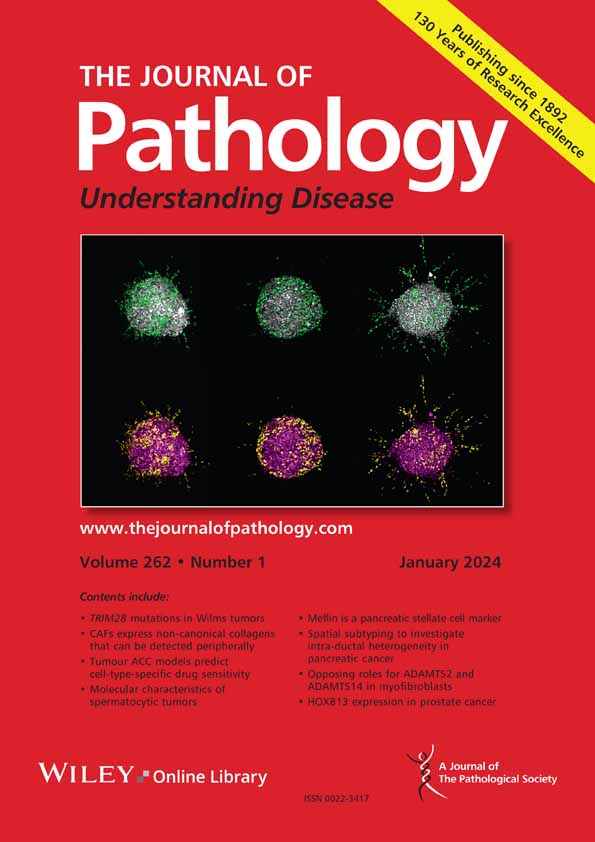求助PDF
{"title":"半乳糖基 IgG 通过人肝星状细胞上的 Fc γ 受体 3a 诱导肝纤维化。","authors":"Cheng-Hsun Ho, Ting-Tsung Chang, Hsien-Chang Lin, Sheng-Fan Wang","doi":"10.1002/path.6303","DOIUrl":null,"url":null,"abstract":"<p>The relevance of aberrant serum IgG <i>N</i>-glycosylation in liver fibrosis has been identified; however, its causal effect remains unclear. Because hepatic stellate cells (HSCs) contribute substantially to liver fibrosis, we investigated whether and through which mechanisms IgG <i>N</i>-glycosylation affects the fibrogenic properties of HSCs. Analysis of serum IgG<sub>1</sub> <i>N</i>-glycome from 151 patients with chronic hepatitis B or liver cirrhosis revealed a positive correlation between Ishak fibrosis grading and IgG<sub>1</sub> with agalactosyl <i>N</i>-glycoforms on the crystallizable fragment (Fc). Fc gamma receptor (FcγR) IIIa was observed in cultured human HSCs and HSCs in human liver tissues, and levels of FcγRIIIa in HSCs correlated with the severity of liver fibrosis. Additionally, agalactosyl IgG treatment caused HSCs to have a fibroblast-like morphology, enhanced migration and invasion capabilities, and enhanced expression of the FcγRIIIa downstream tyrosine-protein kinase SYK. Furthermore, agalactosyl IgG treatment increased fibrogenic factors in HSCs, including transforming growth factor (TGF)-β1, total collagen, platelet-derived growth factor subunit B and its receptors, pro-collagen I-α1, α-smooth muscle actin, and matrix metalloproteinase 9. These effects were more pronounced in HSCs that stably expressed <i>FCGR3A</i> and were reduced in <i>FCGR3A</i> knockout cells. Agalactosyl IgG and TGF-β1 each increased <i>FCGR3A</i> in HSCs. Furthermore, serum TGF-β1 concentrations in patients were positively correlated with agalactosyl IgG<sub>1</sub> levels and liver fibrosis severity, indicating a positive feedback loop involving agalactosyl IgG, HSC-FcγRIIIa, and TGF-β1. In conclusion, agalactosyl IgG promotes fibrogenic characteristics in HSCs through FcγRIIIa. © 2024 The Pathological Society of Great Britain and Ireland.</p>","PeriodicalId":232,"journal":{"name":"The Journal of Pathology","volume":"263 4-5","pages":"508-519"},"PeriodicalIF":5.6000,"publicationDate":"2024-06-17","publicationTypes":"Journal Article","fieldsOfStudy":null,"isOpenAccess":false,"openAccessPdf":"","citationCount":"0","resultStr":"{\"title\":\"Agalactosyl IgG induces liver fibrogenesis via Fc gamma receptor 3a on human hepatic stellate cells\",\"authors\":\"Cheng-Hsun Ho, Ting-Tsung Chang, Hsien-Chang Lin, Sheng-Fan Wang\",\"doi\":\"10.1002/path.6303\",\"DOIUrl\":null,\"url\":null,\"abstract\":\"<p>The relevance of aberrant serum IgG <i>N</i>-glycosylation in liver fibrosis has been identified; however, its causal effect remains unclear. Because hepatic stellate cells (HSCs) contribute substantially to liver fibrosis, we investigated whether and through which mechanisms IgG <i>N</i>-glycosylation affects the fibrogenic properties of HSCs. Analysis of serum IgG<sub>1</sub> <i>N</i>-glycome from 151 patients with chronic hepatitis B or liver cirrhosis revealed a positive correlation between Ishak fibrosis grading and IgG<sub>1</sub> with agalactosyl <i>N</i>-glycoforms on the crystallizable fragment (Fc). Fc gamma receptor (FcγR) IIIa was observed in cultured human HSCs and HSCs in human liver tissues, and levels of FcγRIIIa in HSCs correlated with the severity of liver fibrosis. Additionally, agalactosyl IgG treatment caused HSCs to have a fibroblast-like morphology, enhanced migration and invasion capabilities, and enhanced expression of the FcγRIIIa downstream tyrosine-protein kinase SYK. Furthermore, agalactosyl IgG treatment increased fibrogenic factors in HSCs, including transforming growth factor (TGF)-β1, total collagen, platelet-derived growth factor subunit B and its receptors, pro-collagen I-α1, α-smooth muscle actin, and matrix metalloproteinase 9. These effects were more pronounced in HSCs that stably expressed <i>FCGR3A</i> and were reduced in <i>FCGR3A</i> knockout cells. Agalactosyl IgG and TGF-β1 each increased <i>FCGR3A</i> in HSCs. Furthermore, serum TGF-β1 concentrations in patients were positively correlated with agalactosyl IgG<sub>1</sub> levels and liver fibrosis severity, indicating a positive feedback loop involving agalactosyl IgG, HSC-FcγRIIIa, and TGF-β1. In conclusion, agalactosyl IgG promotes fibrogenic characteristics in HSCs through FcγRIIIa. © 2024 The Pathological Society of Great Britain and Ireland.</p>\",\"PeriodicalId\":232,\"journal\":{\"name\":\"The Journal of Pathology\",\"volume\":\"263 4-5\",\"pages\":\"508-519\"},\"PeriodicalIF\":5.6000,\"publicationDate\":\"2024-06-17\",\"publicationTypes\":\"Journal Article\",\"fieldsOfStudy\":null,\"isOpenAccess\":false,\"openAccessPdf\":\"\",\"citationCount\":\"0\",\"resultStr\":null,\"platform\":\"Semanticscholar\",\"paperid\":null,\"PeriodicalName\":\"The Journal of Pathology\",\"FirstCategoryId\":\"3\",\"ListUrlMain\":\"https://onlinelibrary.wiley.com/doi/10.1002/path.6303\",\"RegionNum\":2,\"RegionCategory\":\"医学\",\"ArticlePicture\":[],\"TitleCN\":null,\"AbstractTextCN\":null,\"PMCID\":null,\"EPubDate\":\"\",\"PubModel\":\"\",\"JCR\":\"Q1\",\"JCRName\":\"ONCOLOGY\",\"Score\":null,\"Total\":0}","platform":"Semanticscholar","paperid":null,"PeriodicalName":"The Journal of Pathology","FirstCategoryId":"3","ListUrlMain":"https://onlinelibrary.wiley.com/doi/10.1002/path.6303","RegionNum":2,"RegionCategory":"医学","ArticlePicture":[],"TitleCN":null,"AbstractTextCN":null,"PMCID":null,"EPubDate":"","PubModel":"","JCR":"Q1","JCRName":"ONCOLOGY","Score":null,"Total":0}
引用次数: 0
引用
批量引用

 求助内容:
求助内容: 应助结果提醒方式:
应助结果提醒方式:


